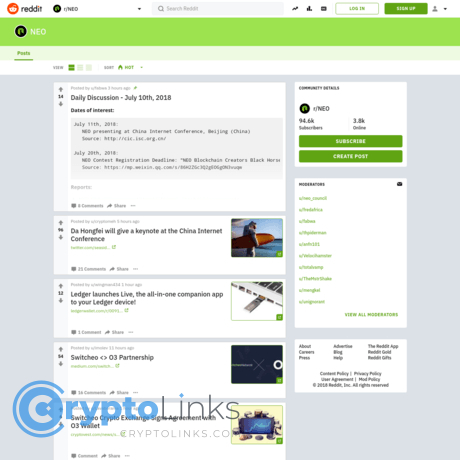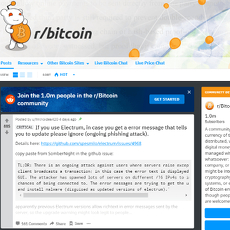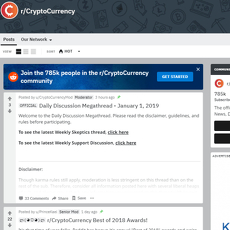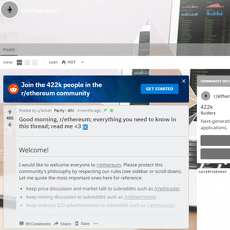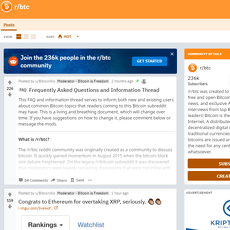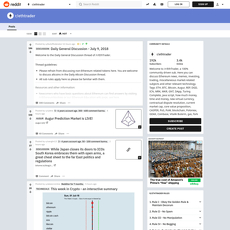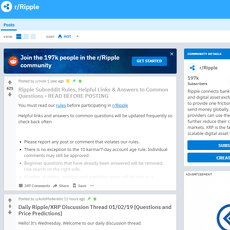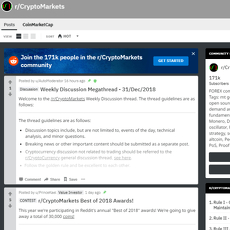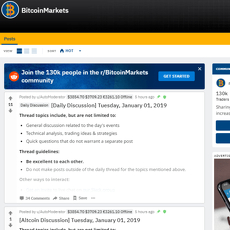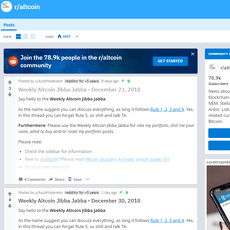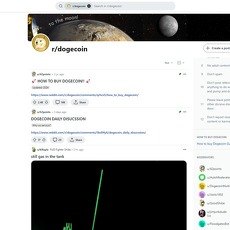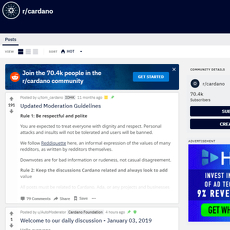r/NEO Review
r/NEO
www.reddit.com
r/NEO Review Guide: Everything You Need to Know (Reddit.com/r/NEO) + FAQ
Are you trying to follow NEO news, dev updates, and real community insight on Reddit—but end up feeling like you’re scrolling through noise? You’re not alone. r/NEO can be a goldmine if you set it up right. If you don’t, you’ll miss the best posts, fall for hype, or get your own posts removed before anyone even sees them.
What makes r/NEO tricky (and how it trips up most people)
Let’s call out the common headaches so we can fix them:
- Hype vs. signal is hard to spot: If you’re new to NEO or Reddit, it’s tough to tell a legitimate update from a recycled rumor or low-effort promo. A slick “partnership” post can rack up votes even if the only source is a Medium article with no proof.
- Great posts get buried by timing and sorting: A thoughtful dev update posted at 3 a.m. can vanish under “Hot” by morning. This isn’t personal—Reddit’s ranking favors early momentum and recency. Most people lurk while a small minority sets the tone, a pattern known as participation inequality (Nielsen Norman Group).
- Rules, flairs, and etiquette are confusing: Misflair a research post as “Discussion” or skip a source link and you risk auto-removal. Comment the wrong way and you’ll get ignored, even if your point is solid.
- Scams and fake giveaways exist across crypto subs: The playbook is predictable—“airdrop” forms, fake support DMs, seed phrase traps, and impersonated team accounts. New users get targeted first, especially after they comment about wallet issues.
Quick example: a legit NEO dev AMA might be announced with a GitHub tag and a Discord link—but if you only browse “Hot,” you’ll see a meme and a sensational rumor instead. If you don’t know how to switch to “New” or “Top (Week/Month),” you’ll miss the AMA entirely.
What you’ll get here (and why it saves time)
I’m going to show you how to make r/NEO work in your favor—without living on Reddit.
- How the subreddit works, what to follow, and how to sort and filter so you stop missing real updates.
- A simple, beginner-friendly Reddit playbook that helps you get answers, not downvotes.
- Safety habits that block common crypto scams and protect your wallet.
- A straight-shooting FAQ so you don’t have to guess what the rules mean.
Think of this as your “set it up once, scroll smarter forever” approach.
Who this is for (you’ll know if it fits)
- NEO holders, builders, and curious lurkers who want reliable updates and aren’t into drama.
- Traders who want to separate price noise from real development news that actually moves fundamentals.
- Anyone who wants to contribute without getting ignored, downvoted, or flagged by automod.
r/NEO at a glance
- What you’ll see: official news, dev updates, ecosystem progress, occasional price talk, and community Q&As.
- Who’s there: a blend of long-time holders, builders, and newcomers—generally helpful and practical.
- Activity pattern: ebbs and flows with major NEO announcements and market cycles; big spikes around releases, AMAs, and integrations.
Pro tip: The best posts usually include verifiable links—GitHub repos, release notes, audit reports, or official announcements. If the claim can’t be checked, treat it like marketing until proven otherwise.
If you’ve ever wondered why a high-effort post gets five votes while a casual meme explodes, or why your reasonable question got zero answers, you’re about to see exactly how to flip that. Ready to meet the sub and see how it’s organized so you can play it to your advantage?
Meet r/NEO: what it is and how it’s organized
Think of r/NEO as the town square for the NEO ecosystem on Reddit. It’s where announcements land, developers chat through proposals, and power users flag the updates that actually matter. It’s not a mega-sub full of noise; it’s a focused stream where you can keep a pulse on NEO news, releases, NEPs, ecosystem progress, and what builders are really paying attention to.
“Signal is scarce. The trick isn’t finding more posts—it’s finding the right ones at the right time.”
If you’ve ever felt like you were late to key updates or stuck scrolling through filler, understanding how this subreddit is set up is the unlock.
Subreddit stats and vibe
r/NEO sits in that sweet spot: mid-sized, focused, and more practical than performative. You’ll see:
- Official updates from NEO-aligned accounts and organizations (new releases, network notices).
- Dev talk around proposals (NEPs), integrations, and node operations.
- Ecosystem posts from projects shipping features, audits, or grants.
- Community Q&As and troubleshooting that’s usually on-topic and helpful.
Expect activity to ebb and flow with major announcements or market catalysts. On quieter days, the best content often comes from builders sharing real work—GitHub commits, testnet milestones, or implementation notes.
Rules and flairs decoded
Rules keep the feed useful. Break them and your post disappears fast; respect them and you’ll get real engagement.
Common rules you should know:
- No scams or shilling: referral links, phishing, and fake giveaways are removed on sight.
- No low-effort promos: if you’re posting about a project, bring receipts—links, changelogs, or a demo.
- Stay on-topic: NEO-focused. General crypto chatter belongs elsewhere unless it directly affects NEO.
- Be transparent: disclose affiliations if you’re connected to what you’re posting.
Flairs are your friend. They’re a fast way to explain your post and a powerful filter for readers:
- News — Official statements, listings, network notices.
- Development — Releases, NEP discussions, repo updates, node/client changes.
- Discussion — Thoughtful takes, ecosystem analysis, strategic questions.
- Support — Wallet issues, node setup help, troubleshooting.
- Research/Explainers — Benchmarks, on-chain data, technical breakdowns.
- AMA — “Ask Me Anything” with teams, devs, or ecosystem funds.
Use flairs to set expectations. For example:
- News: “NEO-CLI vX.Y.Z Release Notes + Upgrade Window”
- Development: “NEP-XX: Proposed Change to Consensus Parameters (Feedback Welcome)”
- Research: “NEO dApp TPS Under Load: Methodology, Results, and Reproducible Repo”
- Support: “OneGate wallet stuck syncing after update—any known fixes?”
Pro tip: when you see a flair that consistently matches your interests, use Reddit’s flair filter in the sub’s header to narrow the feed to those categories.
Pinned threads and mod presence
At the top of r/NEO, pinned posts do a lot of heavy lifting. They usually include:
- Announcements: high-signal updates that matter right now.
- Ongoing megathreads: a place for general chat, price talk (if allowed), or weekly Q&A.
- Event posts: AMAs, upgrade windows, hackathons.
Moderators keep things clean with a light but effective touch. AutoModerator catches common spam patterns and link bait; human mods step in for rule enforcement and safety. If you see something off, report it—that’s how the sub stays useful.
There’s a reason this matters: research shows early interactions shape what the crowd eventually sees. A PNAS study by Muchnik, Aral, and Taylor found that a single early upvote can significantly increase a post’s final score due to social influence. In practice, that means pinned threads and mod curation reduce the chance of low-quality posts snowballing.
How to “read the room”
If you want a fast sense of what matters this week versus what’s just noise, use this quick routine:
- Sort “Top – This Week” or “This Month” to see the sub’s consensus priorities. This is your snapshot of what the community actually values.
- Scan comment sections for context. The best insights often live below the fold—links to repos, PRs, audits, or nuanced pushback from devs.
- Check the poster’s history if a claim sounds big. Builders with consistent contributions tend to link to work you can verify: commits, change logs, testnets.
- Look for proof-of-dev signals in posts: release notes, GitHub diffs, benchmark methodology, contract addresses, or audit hashes.
- Prioritize flairs like News, Development, Research when your time is limited; save Discussion for when you want to explore viewpoints.
Examples of “reads” that pay off:
- A Development thread proposing a NEP with concrete edge cases discussed in comments—bookmark-worthy for anyone running infrastructure.
- A News post about a partnership that also links to an integration demo or testnet endpoint—higher trust than press-release-only updates.
- An AMA with a team showing release cadence and roadmap trade-offs—often where you learn what’s not in marketing decks.
When in doubt, remember: claims need links. If a post doesn’t give you enough to verify, check the comments. If the comments are silent on proof, keep scrolling.
Feeling the rhythm of the sub is half the battle. The other half is setting up your Reddit so the best NEO content finds you first. Want a simple, step-by-step setup that surfaces high-signal posts in minutes a day—and gets you actual answers when you ask questions? Let’s set that up next.
Beginner’s walkthrough: use Reddit and r/NEO the smart way
If you’ve ever opened r/NEO and thought, “Where’s the good stuff?” you’re not alone. The trick isn’t to scroll harder—it’s to set up Reddit so the best NEO news, dev updates, and real answers find you.
“Your attention is your algorithm.” What you upvote, comment on, and save shapes what the entire subreddit sees next.
The 90-9-1 rule and what it means for you
Reddit runs on participation inequality: about 1% create, 9% contribute, 90% lurk. UX researcher Jakob Nielsen documented this pattern years ago, and it still fits Reddit today. Translation: your tiny actions have oversized impact on r/NEO.
- Upvotes = oxygen. One early upvote can change a post’s fate. In a Science study (Muchnik, Aral, Taylor, 2013), a single positive nudge created lasting herding effects on social news rankings.
- Comments steer the conversation. A short, useful comment can keep legit dev updates at the top and nudge hype into the background.
- Reports clean the feed. See a fake giveaway or phishing link? Reporting it protects everyone and raises the average quality.
Try this right now: the next time you see a NEO release note with a GitHub link, hit Upvote and add a 1–2 line summary. You’ve just made r/NEO smarter for thousands of readers.
Quick-start: from zero to a useful feed
Five minutes to turn chaos into signal:
- Join and enable alerts. Hit Join on r/NEO. Tap the bell:
- Desktop: Bell → All posts for faster updates.
- Mobile: Joined → Manage notifications → New posts.
- Set your default sort. Use Top → This Week or This Month to see quality first. Then check New once or twice a day so you catch fresh releases and AMAs.
- Use “Old Reddit” for speed. Bookmark old.reddit.com/r/NEO/?sort=new. It loads faster and makes scanning easier.
- Search before you ask. In the sub’s search bar, try a specific keyword like “NEO-CLI 3.7 error” or “GAS claim Neon Wallet”. If Reddit’s search feels weak, use Google:
- site:reddit.com/r/NEO “release notes”
- site:reddit.com/r/NEO N3 wallet support
- site:reddit.com/r/NEO “NGD” GitHub
- Filter by flair. On desktop, use the Flair filter to show News, Development, Support, or Discussion only.
That’s your starting kit. With those tweaks, you’ll catch real NEO updates without losing hours to noise.
Posting and commenting that actually works
When you post or ask for help on r/NEO, clarity beats everything. Make it easy to read, easy to verify, and easy to answer.
- Title templates that win attention:
- [Release] NEO-CLI v3.7.0 — Full notes + GitHub diff
- [Support] GAS claim showing 0 in Neon Wallet v2.19 — steps tried + logs
- [Discussion] N3 contract deployment fees — data from last 3 months
- Add sources up front. Link the official blog, GitHub releases, repos, or block explorer txids. If you’re quoting a dev, add the original link.
- Flair correctly. Mods and readers use flairs to triage. If in doubt, pick Discussion or Support and adjust if a mod asks.
- Be specific. For support, include OS, wallet/client version, steps tried, and screenshots. Specific inputs get specific answers.
- Disclose affiliations. If you’re with a project, say it. Credibility rises when you’re transparent.
- Avoid price-only bait. “When moon?” gets ignored or removed. If you talk markets, bring data: liquidity, listings, catalysts, or on-chain stats.
Comment formula I use when I want traction:
- Summary: One sentence of the key point.
- Evidence: One link to a primary source (GitHub, official blog, explorer).
- Next step: What readers can do now or what to watch next.
Timing matters too. Early engagement predicts final visibility in social feeds (multiple peer‑reviewed studies show strong “rich get richer” effects). If you post, stick around for the first hour to answer questions and add context—your replies can be the difference between buried and seen.
Finding what you need, fast
When you’re hunting for a specific NEO answer or legit update, use these shortcuts.
- Smart search queries:
- site:reddit.com/r/NEO “release” GitHub
- site:reddit.com/r/NEO N3 “contract” fee
- site:reddit.com/r/NEO “Neon Wallet” “private key” (then read comments for solutions)
- Check the poster’s trail. Click the username → Overview. Red flags: all giveaway posts, no technical history, copy‑paste comments. Green flags: consistent NEO threads, helpful replies, linked repos.
- Save and tag your findings. Click Save on high-signal posts (AMAs, releases, audits). Build your own NEO knowledge base you can revisit before you ask a question.
- Follow power users. If someone always brings receipts—release diffs, on-chain data, benchmarks—hit Follow on their profile. Turn on post notifications so you catch their next thread early.
- Use Reddit Enhancement Suite (desktop). RES lets you filter by user and keyword, and preview links. It’s a time-saver when you’re scanning New during busy release weeks.
- Mute what wastes your time. If a topic or user keeps you in low-signal loops, use Mute/Block. Protect your attention; it’s your edge.
One last nudge: treat every upvote, comment, and save like directing a spotlight. On a focused sub like r/NEO, a tiny push from you can move a real dev update ahead of a meme. That’s how we keep the feed sharp.
So, what should you actually read first the moment you land on r/NEO—releases, audits, AMAs, or community research? I’ve tested a stack that saves hours and nails the signal. Ready to see the exact post types that are worth your time?
Find the signal: content worth your time on r/NEO
I’ve wasted enough late nights chasing shiny threads that led nowhere. You don’t have to. Here’s how I zero in on the posts that actually move the needle.
“The signal is the truth. The noise is what distracts us from the truth.” — Nate Silver
When I scan r/NEO, I’m hunting for verifiable progress, time-stamped commits, and sources I can cross-check in under a minute. If a post can’t pass those tests, it doesn’t get my attention.
Official announcements and dev updates
Nothing beats primary sources. I put these at the top of my feed and read them before anything else.
- Look for names you recognize: posts or comments from neo-project contributors, Neo team members, and long-standing ecosystem orgs like COZ, Neo News Today, or NeoSPCC.
- Follow the breadcrumbs: credible posts link to GitHub releases, tags, or PRs. For example, a real client update should include a release note like “Neo-CLI v3.x” with a release tag and changelog, not just a tweet.
- Roadmap confirmations: roadmap shifts should be backed by an official post or a merged milestone. I check the org roadmap/issues to see if dates and scopes match the announcement.
- Language matters: watch for concrete phrasing like “merged,” “released,” “available on MainNet/TestNet,” and links to docs. Vague words—“coming,” “soon,” “partnered”—are a yellow flag until verified.
Quick check I use: If it’s not on an official channel or repo within 24 hours, I treat it as unconfirmed.
Research, explainers, and technical analysis
The community posts some excellent explainers. I treat them like open-source research: useful when they’re sourced and reproducible.
- Demand receipts: the best posts include links to repos, explorer views, or docs. If someone claims “X improves GAS efficiency,” I want a benchmark, not a meme.
- Replicable steps: good analysts show how they got the data—API endpoints, contract addresses, or scripts. If you can’t replicate it, assume it’s commentary.
- Healthy debate in comments: smart pushback and follow-up links are a positive signal. Silence or cheerleading only? That’s not research; that’s marketing.
- Beware karma bias: studies on social influence (Muchnik et al., 2013) show early upvotes can skew perception. I read the sources before I trust the score.
What I save: explainers that teach me something I can use next month—tokenomics breakdowns, performance notes across N3 tools, migration guides, and security learnings from audits.
Ecosystem and dApp progress
Updates from wallets, DeFi protocols, infra providers, and tooling are where adoption shows up. I separate signal from PR by verifying three things.
- Code or it didn’t happen: is there a repo update, contract address, or release tag? A real integration leaves a trail. Check the project’s GitHub, not just their blog.
- Audits and addresses: if a dApp claims an audit, I look for a published PDF from firms like CertiK, PeckShield, or SlowMist, and I verify the audited contract matches the address they share.
- User-facing proof: can I interact on TestNet/MainNet? If the post claims “live,” I expect a working front end, a transaction on an explorer, or a CLI flow I can follow.
Green flags: migration notes for N3, clear changelogs, precise contract versions, and screenshots with transaction hashes you can click through.
Market chatter and where it belongs
Price talk is loud, but value is in the details buried under it. I treat it like a rummage sale—search carefully, pick only what’s real.
- Thread placement: most subs keep price chat in daily/weekly threads. If it’s not there, I assume it’s fishing for engagement.
- Extract data, ignore predictions: I skim comments for verifiable nuggets—new listings, liquidity pool changes, fee updates, exchange notices, or upgrade timelines. Then I click sources.
- Ask for the link: if someone claims “listing soon,” I ask for the official announcement URL. No link, no brain space.
Tip: keep a small note with recurring catalysts you care about—network upgrades, major exchange actions, big dApp launches—so you filter chatter against what actually moves NEO.
AMAs and proof-of-dev
AMAs are where teams reveal more than they planned. I mine them for specifics and then test those claims against public code.
- Skim smart: sort AMA threads by top comments, then search within the page for “when,” “how,” “testnet,” “contract,” “PR,” or “audit.”
- Look for artifacts: demo repos, preview branches, TestNet endpoints, contract IDs, or screenshots with commit hashes. “We’re excited” means nothing without these.
- Check the tempo: strong teams ship in public. If an AMA promises a feature, I look for a PR or issue created within a week. Missed timelines can happen, but absence of activity is a red flag.
Power move: save the best AMAs and build a mini-index of direct quotes with links. It makes future updates easy to verify, and it’s great for calling back promises—politely.
Bottom line: if a post brings sources, code, or on-chain proof, I give it time. If it brings vibes only, I keep scrolling.
One more thing—before you click that “airdrop” link or reply to a too-friendly DM, want the simple checks I use to avoid getting burned? The next part is your seatbelt.
Safety first: scams, rules, and staying secure
I’ve watched great posts get overshadowed by slick scams more times than I care to admit. The good news: with a few guardrails, you can enjoy r/NEO without becoming someone’s exit liquidity. Think of this as your always-on safety net.
“Trust is earned in inches and lost in miles.” In crypto, keep your trust on a short leash.
Common red flags in crypto subs
Scammers recycle the same tricks because they work. If you spot any of these, stop, screenshot, and report:
- “Guaranteed returns” or “risk-free staking.” No legit NEO project guarantees profits. Period.
- Unsolicited DMs after you comment. “Hello sir/ma’am, I’m official support, I can recover your funds.” This is a script, not a savior.
- Fake support accounts. Look for new or low-karma profiles pretending to be mods, NEO team, or wallet support.
- Seed phrase or private key requests. No support agent, mod, or dev will ever ask. Not for “verification,” not for “migration,” not for anything.
- Too-good-to-be-true giveaways. “Send 1 NEO, get 2 NEO back.” Classic wallet-drain bait.
- “Claim your GAS here” websites. NEO’s economics changed with N3—there’s no legit site that needs your seed to “claim.” If you’re voting and earning GAS, it happens via your wallet, not a random link.
- Off-platform pressure. “Move to Telegram/Discord right now to fix your issue.” Scammers isolate you, then rush you.
- Impersonation-by-handle. Extra characters, swapped letters (NεO vs NEO), or a flair meant to look official. Check usernames carefully.
If you think “surely no one falls for that,” they do. The FTC has repeatedly warned that crypto scams drain billions, and Chainalysis data shows scams remain among the top crypto crime revenue sources—even when markets cool.
Sub rules that protect you
r/NEO’s basic rules are there to keep you safe and the feed clean. Use them to your advantage:
- No referral links or shills. Hidden promos are a common vector for scams. If you see one, report it—don’t argue in the comments.
- No phishing or impersonation. Mods remove suspicious posts. You can help by using the “Report” button and selecting scam/spam.
- Follow flairs. Real updates and dev posts tend to have the right flairs and sources. Scams often hide behind “Discussion” with vague claims.
- Don’t engage scammers publicly. Replying gives them oxygen and new targets. Report, mute, move on.
Pro tip: Mods won’t DM you asking for funds or keys. Reddit’s own policy on impersonation backs you up—see Reddit’s impersonation rules and use Modmail if something feels off.
Personal security checklist
Here’s the short list I live by when I’m browsing, voting, or testing dApps in the NEO ecosystem:
- Keys stay offline. Never share your seed or private key. Use a hardware wallet for any balance you care about.
- Stick to official domains. Bookmark and type them manually:
- neo.org (official)
- github.com/neo-project (source)
- neon.coz.io (Neon Wallet by COZ)
- o3.network (O3 Wallet)
- neoline.io (NeoLine Wallet)
- Enable 2FA everywhere. Use an authenticator app, not SMS. On Reddit: User Settings → Safety & Privacy → Two-factor authentication.
- Use a password manager. Unique, long passwords for Reddit, wallets, and email. Rotate if you’ve clicked anything sketchy.
- Lock down DMs. In Reddit settings, limit chat requests to people you follow. Scams often start with “Can we talk in private?”
- Verify “official” announcements. Cross-check on at least two channels (e.g., r/NEO pinned posts + neo.org or the project’s GitHub). If it’s real, it won’t only live in a screenshot.
- Check the contract you’re signing. Before authorizing actions in your NEO wallet, review the contract hash and method. If your wallet can’t show clear info, pause and research.
- Test small. For new contracts or dApps, send a tiny amount first. If fees or results look off, stop.
- Assume “claim GAS” links are traps. Any “claim” that requires a seed is a scam. If you’re unsure, ask the sub with sources.
What to do when something feels off
When your gut says “hmm,” here’s a simple, fast protocol that saves face and funds:
- Pause interaction. Don’t click, don’t sign, don’t send. Take a breath.
- Screenshot everything. Capture the post/DM, profile, and links. If they delete, your receipts remain.
- Ask the sub for a second opinion. Post a quick question with proof and sources. The community is quick to flag fakes.
- Report and move on. Use Reddit’s report feature. If it targets the sub, send Modmail. Don’t debate scammers.
- Scan your setup. If you clicked a link or signed something odd:
- Revoke app/site permissions if applicable to your wallet.
- Move funds to a fresh wallet with a new seed (hardware if possible).
- Change passwords and rotate 2FA backups.
Last month, someone pinged me after “support” walked them through a “recovery.” They lost everything in minutes. That conversation always ends the same way: “I knew something was off.” Listen to that voice. It’s your best security tool.
Want a simple stack of links and tools I use to verify NEO updates, track commits, and set alerts so I don’t live on Reddit all day? I’ll show you exactly what I keep pinned next—ready to see it?
Tools and resources to level up your r/NEO experience
You don’t need 20 tabs open to stay ahead on NEO. Set up a small stack of high-signal tools once, and let the best updates come to you. Here’s exactly what I use and how I configure it so I don’t miss real development, ecosystem progress, or meaningful market context.
Must-bookmark links
- Community pulse: r/NEO
- Official confirmations: neo.org and the core GitHub org github.com/neo-project
- Key repos to watch:
neo,
neo-cli,
neo-vm,
neo-modules
- Explorers (for real progress on-chain):
NEO Tracker,
OKLink NEO,
Neo Explorer
- Context you can trust:
NEO News Today,
CoinDesk,
The Block
- Official social and help:
X/Twitter and community Discord/Telegram links
Track NEO like a pro
Here’s a lightweight setup that saves hours and still catches the real signals.
- Reddit to RSS (for low-noise updates): Add https://www.reddit.com/r/NEO/.rss to Feedly or Inoreader. Create a filter to highlight titles with “release”, “testnet”, “mainnet”, “RC”, or “AMA”.
- Push alerts for only the big stuff: Use IFTTT or Zapier RSS to send r/NEO RSS posts that match “release|testnet|mainnet” to your email, Telegram, or Discord. That way you only get pinged for high-signal keywords.
- GitHub releases without the noise: On each core repo, click Watch → Custom → Releases only. Or subscribe via RSS:
https://github.com/neo-project/neo/releases.atom (repeat for the other repos). This is the cleanest “proof-of-dev” feed.
- On-chain confirmations: Bookmark the asset and contract pages you care about in
NEO Tracker or
OKLink, and set browser bookmarks to “Open all” so you can check everything in one pass.
- Price alerts that actually matter: Use TradingView for alerts like “crosses 200D MA” or “volume spike > 150% 20D avg”. Add backup push alerts in
CoinGecko or
CoinMarketCap for listing changes and big swings.
- Bundle, don’t ping-ping-ping: Route routine items to RSS and reserve push for critical changes. It keeps you sharp.
Research from UC Irvine’s Gloria Mark shows interruptions can take over 20 minutes to fully recover from—batching alerts preserves focus.
If you want this even tighter, set one weekly “NEO catch-up” block on your calendar. Open your RSS, your saved r/NEO posts, and your GitHub releases—in 15 minutes you’ll be truly up to speed.
Companion communities and alt subs
- Broad market currents:r/CryptoCurrency
- Market microstructure and catalysts: r/CryptoMarkets
- Security and cautionary tales: r/ccScamIndex (useful for spotting scam patterns that hit smaller subs)
- Builder chat: Official NEO Discords listed on neo.org/community (go here for integration help, SDK questions, and testnet notes)
Tip: when you read a strong thread in a companion sub, click into commenters’ profiles. Power users often cross-post or share repos you’ll want to follow.
I also keep a living list of crypto tools, explorers, news feeds, and wallet resources on Cryptolinks so you can cut through the noise fast.
Want a fast, no-BS FAQ on sorting, filtering, and staying safe on Reddit—plus the quirks every r/NEO newcomer stumbles on? Keep going; I’m answering those next.
FAQ: r/NEO and Reddit basics
What is the 90-9-1 rule on Reddit?
The short version: about 90% of people lurk, 9% engage, and 1% create. That means a tiny slice of posts and comments shape what most people in r/NEO actually see. This isn’t just folklore—participation inequality has been documented for years by the Nielsen Norman Group, and it shows up across online communities.
Here’s why you should care: one upvote or downvote early on can snowball. A well-known study in PNAS found that an early upvote measurably increases the chances a post keeps getting more upvotes—classic social influence bias. In practice, your actions matter a lot more than you think.
- See a clean dev update with GitHub links? Upvote it right away.
- Spot a vague claim with no sources? Ask for proof or downvote it.
- Catch a phishing attempt? Report it and move on.
Sources: Nielsen Norman Group on participation inequality, PNAS: Social influence bias in online ratings
How to use Reddit effectively if you’re new
- Subscribe + notifications: Join r/NEO and tap the bell if you want alerts for new posts. During releases or events, switch to New for real-time updates.
- Sort smarter: Top (Week/Month) for quality. New for speed. Rising when markets move or announcements land.
- Search first: Use queries like site:reddit.com/r/NEO wallet stuck or site:reddit.com/r/NEO NEP-17. You’ll find past answers and save yourself back-and-forth.
- Flair matters: Filter by flairs (News, Development, Support, etc.) to cut noise. On desktop, look for “Post flair” filters in the sidebar; on mobile, use the filter icon at the top of the sub.
- Post like a pro: Clear title, context in the body, links to sources (GitHub, docs, official blog), and the right flair. If you’re asking for help, include OS, wallet/app version, error messages, and screenshots.
- Be human: Be specific, be kind, ignore trolls. Never share keys or seed phrases. Don’t click random DMs.
- Save and follow: Long-press posts on mobile (or use the Save icon on desktop) to build your own feed of quality updates.
Other quick r/NEO questions
- Is price talk allowed? Usually yes, but it often belongs in daily/weekly threads. Check the rules in the sidebar and pin posts first.
- How do I filter? Use flairs to show only News, Development, or Support. Sort by Top (Week/Month) to see the community’s best stuff. Save posts to revisit updates and AMAs.
- How do I avoid scams?
- Never share seed phrases or private keys. No legit support will ask for them—ever.
- Verify “official” announcements across neo.org, the official blog/X, and GitHub.
- Beware giveaways or “support” DMs after you post. Assume scam until proven otherwise.
- Use Reddit’s security tips if something feels off: Security & Privacy.
- How do I contribute without getting ignored? Add sources, ask focused questions, and summarize links you share. If you attend an AMA, post time-stamped highlights with links. That kind of effort gets traction.
- Can I promote my dApp? Usually yes if you’re transparent and follow flair rules. Say who you are, link your repo or docs, and focus on what’s useful to users/devs. Pure hype gets buried or removed.
- What counts as credible? Verified NEO channels, maintainers on neo-project GitHub, release notes, audits, and reproducible steps. Screenshots are fine, but links to code or docs win.
- Best way to keep up with AMAs? Turn on subreddit notifications and watch pinned posts. If you like RSS, plug r/NEO’s RSS feed into your reader and set a filter for “AMA.”
- How do I ask for technical help? Use the Support flair and include: app/wallet name + version, platform, what you tried, errors, and a screenshot (no sensitive info). You’ll get faster, better answers.
- Where do I check specs or standards? Start with NEO Docs and GitHub. If a post claims a change, look for an issue, PR, or release tag to confirm.
Wrap-up
r/NEO is as useful as you make it. Set smart filters, check sources, and help good posts rise. Your upvotes, thoughtful comments, and reports shape what the rest of us see—seriously.
If this helped, bookmark it and keep an eye on my latest crypto picks and tools here: Cryptolinks. Want the freshest updates? I post new notes and guides on the news page regularly. See you on r/NEO.

